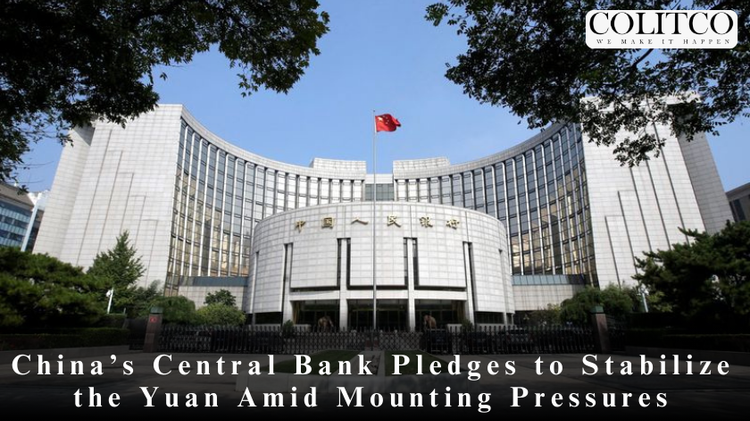China's Central Bank Pledges to Stabilize the Yuan

The People’s Bank of China (PBOC) has reaffirmed its determination to stabilise the yuan (RMB) during a period of economic challenges. The central bank announced steps to counteract external and domestic pressures threatening the currency’s stability.
Measures to Support the YuanPBOC plans to enhance treasury bond trading operations and maintain a robust liquidity environment for government bond issuance. State media outlet CCTV reported this as part of the central bank’s broader efforts to protect the currency from disorderly fluctuations.
The central bank emphasised its commitment to ensuring a “reasonable and balanced” exchange rate for the yuan. While allowing market forces to guide the currency’s value, the bank has promised intervention when necessary.
“We will leverage foreign exchange reserves and strengthen counter-cyclical measures to prevent disorderly volatility,” a PBOC spokesperson said. The central bank stressed the importance of a stable yuan to support economic recovery and investor confidence.
Related: China’s Yuan Policy Draws Trump Administration’s Scrutiny
Yuan Faces Mounting PressureThe yuan has recently encountered significant challenges. Analysts attribute these to both external and internal factors, which have placed downward pressure on the currency.
Strengthened U.S. DollarThe Federal Reserve’s prolonged interest rate hikes have bolstered the U.S. dollar. A stronger dollar often weakens other currencies, including the yuan, in global markets.
Subdued Domestic RecoveryChina’s post-pandemic economic recovery has been slower than expected. Consumer spending has decreased, and investment inflows have fallen short of projections.
Trade ImbalancesWeaker global demand for Chinese goods has also exacerbated concerns over yuan depreciation. This has added to the economic strain, challenging the central bank’s efforts to stabilise the currency.
Addressing Speculative TradingThe PBOC aims to curb speculative trading that could heighten yuan volatility. “We are closely monitoring global market conditions and speculative behaviours that could worsen fluctuations,” said the spokesperson. The central bank also stated its readiness to take targeted actions if necessary.
Responding to External AllegationsThe central bank’s announcement follows comments from Peter Navarro, Donald Trump’s senior trade adviser, who accused China of currency manipulation. “Navarro’s statements have no factual basis,” responded China’s embassy in Washington. “China has reiterated on many occasions that it will not engage in competitive currency depreciation.”
The central bank has consistently denied allegations of manipulating the yuan’s value to gain an unfair advantage in international trade.
Also Read: Trump Trade Adviser Warns China Against Currency Manipulation Amid Yuan Depreciation Talks
Global Implications of a Stable YuanThe PBOC’s commitment to stabilising the yuan extends beyond China’s borders. As one of the most traded currencies globally, the yuan’s performance directly impacts international trade and investment. Emerging markets with close economic ties to China are especially affected.
“A stable yuan is crucial not only for China but also for its trading partners and the global economy,” an economist from a major financial institution explained.
The central bank’s efforts to maintain stability are seen as essential for global financial markets. Diverging monetary policies among major economies have heightened uncertainty, making the yuan’s stability even more critical.
Balancing Domestic and Global ChallengesThe PBOC must balance domestic economic concerns with global market dynamics. Sluggish global growth and ongoing geopolitical tensions remain significant hurdles. The central bank has acknowledged these challenges but reiterated its determination to support the yuan.
“We are committed to protecting the yuan and ensuring economic recovery amid complex market conditions,” stated the spokesperson.
Outlook for the YuanThe central bank’s renewed focus on stabilising the yuan is expected to bolster confidence among businesses and investors. However, experts caution that the road ahead remains fraught with difficulties.
External pressures, such as monetary tightening by the U.S. Federal Reserve, continue to pose risks. Slower domestic growth and trade imbalances further complicate the situation.
Despite these challenges, the PBOC remains resolute in its efforts. By leveraging its policy tools and focusing on structural economic adjustments, the central bank aims to navigate these uncertain times effectively.
ConclusionThe People’s Bank of China has demonstrated its commitment to maintaining the yuan’s stability during a challenging period. Its measures aim to balance market forces with timely interventions, ensuring a robust economic recovery.
As China addresses internal and external pressures, the central bank’s actions will significantly influence both domestic and global markets. Policymakers, investors, and businesses worldwide will closely watch the yuan’s trajectory in the coming months.
DisclaimerVisited 34 times, 34 visit(s) today















































